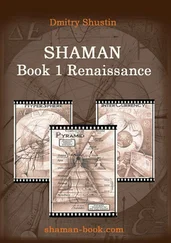These repulsive creatures that simultaneously resembled spiders and primates never risked openly attacking human beings and fed on carrion dragged down from the surface to the station they had made their own. A large herd of them nested at the Prospect, and all the tunnels nearby were filled with the sickly-sweet stench of decomposition. At the station itself the sheer pressure of it made men feel dizzy, and many of them found it so unbearable that they pulled on their gas masks on the approaches to the station.
Homer, who remembered this distinctive feature of Nakhimov Prospect only too well, hastily pulled the mask of his respirator out of his knapsack and put it on. Ahmed, who had packed hurriedly, gave Homer an envious glance and covered his face with his sleeve: the repugnant vapours emanating from the station gradually enveloped them, spurring them to move on quickly.
But Hunter didn’t seem to smell anything.
‘Something poisonous? Spores?’ he asked Homer.
‘The smell,’ Homer mumbled through his mask and wrinkled up his face.
The brigadier examined the old man searchingly, as if trying to work out if Homer was making fun of him, then shrugged his massive, broad shoulders.
‘The usual,’ he said and turned away.
He shifted his grip on his short automatic, beckoned for them to follow him and moved on ahead, stepping softly. About fifty steps further on, the hideous stench was joined by an obscure murmuring. Homer wiped away the perspiration that had started streaming down his forehead and tried to curb the galloping pace of his heartbeat. They were really close now.
The groping flashlight beam finally found something. It swept the darkness off broken headlights peering blindly into nowhere, off the glass of dusty windscreens cobwebbed with cracks, off light-blue metal panelling that stubbornly refused to rust. There ahead of them was the first carriage of a train that blocked the throat of the tunnel like a gigantic cork.
The train had died ages ago, it was beyond all hope, but every time he saw it Homer felt like a little boy, he wanted to climb into the devastated cabin, caress the keys and switches of the instrument panel, close his eyes and pretend that once again he was dashing through the tunnels at full speed, pulling behind him a string of brightly lit carriages filled with people – reading, dozing, gazing at advertisements or struggling to make conversation above the rumble of the engines.
‘If the alarm signal “ATOM” is given, drive to the nearest station, stop there and open the doors. Assist the efforts of civil defence units and the army to evacuate the injured and seal off the stations of the Metropolitan…’
The instructions on what train drivers should do on Judgement Day were precise and simple. Wherever it was possible, they were carried out. Most of the trains that froze at the platforms of the stations had fallen into a lethargic sleep and gradually been cannibalised for spare parts by the inhabitants of the Metro, who, instead of spending a few weeks in this refuge, as promised, had been detained here for all eternity. In a few places the trains had been preserved and converted into homes, but that seemed blasphemous to Homer, who had always seen trains as possessing a distinctly animate essence – it was like having your favourite pet cat stuffed and mounted. In places that were unfit for human habitation, like Nakhimov Prospect, the trains stood, gnawed on by time and vandals, but still intact.
Homer simply couldn’t take his eyes off the carriage. A phantom alarm signal wailed in his ears, drowning out the ever-louder rustling and hissing sounds from the station, and a deep, low siren blasted out the signal that had never been heard before that day: one long blast and two short ones: ‘ATOM’!
A lingering clang of brakes and a bewildered announcement in all the carriages ‘Ladies and gentlemen, for technical reasons this train will not proceed any further.’ It was too soon yet for the driver mumbling into the microphone, or Homer, his mate, to grasp the anguished hopelessness of those hackneyed words. The rasping sound of hermetic doors straining shut, separating off the world of the living from the world of the dead forever… According to instructions, the gates had to be finally locked no later than six minutes after the alarm was sounded, no matter how many people were left on the other side. If anyone tried to prevent the gates closing, the recommendation was to shoot at them.
Would a little police sergeant, who guarded his station against homeless bums and drunks, be able to shoot a man in the stomach because he was trying to hold back the immense metal behemoth, in order to give his wife, who had broken her heel, time to run inside? Would a high-handed turnstile-woman in a round uniform cap, who had spent her thirty-year career in the Metro perfecting two skills – not letting people through and blowing her whistle – be able to refuse entrance to a desperately panting old man with a pathetic row of medal ribbons? The instructions gave them only six minutes to change from a human being into a machine. Or a monster.
Women squealing, men clamouring indignantly, children sobbing desperately. The staccato popping of pistol shots and rumbling bursts of automatic fire. Recorded appeals to remain calm, relayed through every speaker in a metallic, passionless voice – they had to be recorded, because no human being, knowing what was happening, could possibly have kept his presence of mind and simply said it like that, indifferently: ‘Do not panic…’
Tears, prayers…
More shooting.
And precisely six minutes after the alarm, one minute before Armageddon – the rumbling funereal clang as sections of hermetic doors lock together. The reverberating clicks of the bolts. Silence.
The silence of the crypt.
They had to walk along the wall past the carriage. The driver had braked too late – perhaps he had been distracted by what was happening at that moment on the platform… They clambered up a cast-iron ladder and a moment later they were standing in an amazingly spacious hall. No columns, just the half-cylinder of a single semi-circular vault, with egg-shaped recesses behind the lamps. An immense vault, arching over the platform and both tracks, together with the trains standing on them. The structure is incredibly elegant – simple, divinely light and uncluttered. Only don’t look down at your feet, at the floor ahead of you. Don’t let yourself see what the station has been turned into now. This grotesque graveyard, where no rest could possibly be found, this macabre meat market, piled high with gnawed skeletons, rotten carcasses, chunks ripped off someone’s trunk. The vile creatures have greedily dragged in here everything they could grab anywhere within their extensive domain, more than they can devour immediately, reserves for future use. These reserves putrefy and decompose, but the brutes carry on accumulating them incessantly.
In defiance of the laws of nature, the heaps of dead meat moved as if they were breathing, and a repulsive scraping sound could be heard on all sides. The beam of light picked out one of the strange figures: long, knotty limbs; flabby, grey, hairless skin, hanging down in folds; a crooked spine, dull eyes blinking weakly, immense ears moving as if they had a life of their own.
One creature gave a hoarse cry and trudged unhurriedly to the open doors of a carriage, stepping with all four of its arm-legs. Other corpse-eaters started climbing down off other heaps in the same lazy fashion, hissing indignantly, sniffling, baring their teeth and snarling at the travellers.
Standing erect, they barely came up to Homer’s chest, and he was short. He also knew perfectly well that the beasts were cowardly, that they were unlikely to attack a strong, healthy man. But the irrational horror that Homer felt at the sight of the creatures was rooted in nightmares, in which he lay all alone, exhausted and abandoned in a deserted station, and the beasts were creeping ever closer. Like sharks in the ocean, who can scent a drop of blood from kilometres away, these creatures could sense the approach of death, and they hurried to be there when it arrived.
Читать дальше











